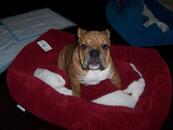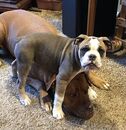Dollys Owner
Active member
- Feb 20, 2017
- 2,005
- 25
- Country
- Canada
- Bulldog(s) Names
- Honey
I don't think your male bully is at any risk of getting more cystine stones since he had them surgically removed and now has been neutered so will not develop any new ones. Bulldogs and mastiffs have type 3 cystinuria which is only in intact bulldogs.
[MENTION=16619]Cbrugs[/MENTION]....I would like to share my experience with cystine stones in hopes it will help you with your baby. I have an 18 month old male bully, intact at the onset of all of this. I would also like to add, intact only because he is very very high anesthetic risk, with surgeries only being done at the university.
About a month ago, he began having trouble urinating, urinating frequently with traces of blood in his urine. Urinalysis showed some cystine crystals in his urine. They took an x-ray and an ultrasound was done, ultrasound showed a pretty good size stone. Since these do not dissolve with medication like other types of stones. We had no other option but to have them surgically removed and have him neutered at the same time. His prostate is also very enlarged, which i'm told should go down now that he is neutered. Having an intact male without mating is never a good thing.
After doing lots of research I have found this to be a genetic defect, but not all dogs born with cystinuria will develop stones. In a study of five generations of one offspring, only one of six cystinuric males formed stones. Although a low protein diet can help, actual experiences of people who have attempted to prevent the stones from forming with diet have not been positive. It's also hard for cystine stones to form in alkaline urine (dog urine is normally acidic), but maintaining a constant alkaline urine with diet or supplements is difficult, and can lead to the formation of other types of stones, esp in stone-forming males. Furthermore, stones will not dissolve in alkaline urine, if the urine becomes acidity even briefly, stones can form and will not dissolve just because alkaline urine is achieved. It seems the use of medications is the most successful, in preventing stones from forming. Something I plan on discussing with his vet at our post-op appt.
Well I'm happy to say surgery was a success without any complications. He is now home recovering quite well! My only fear at this time is him developing them again which is a very high probability.
Happy bully mom (for now)!




